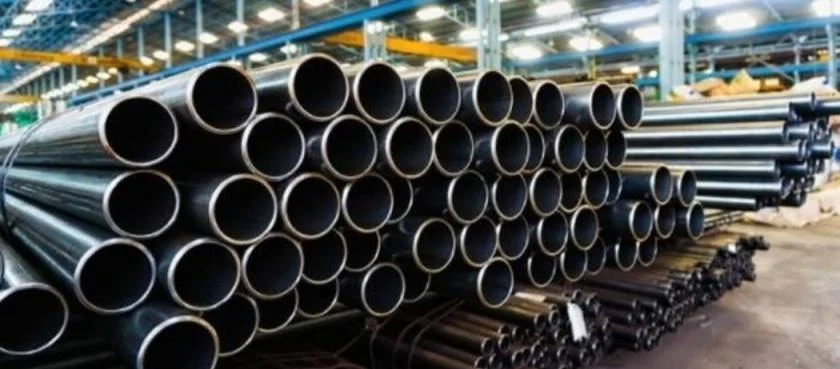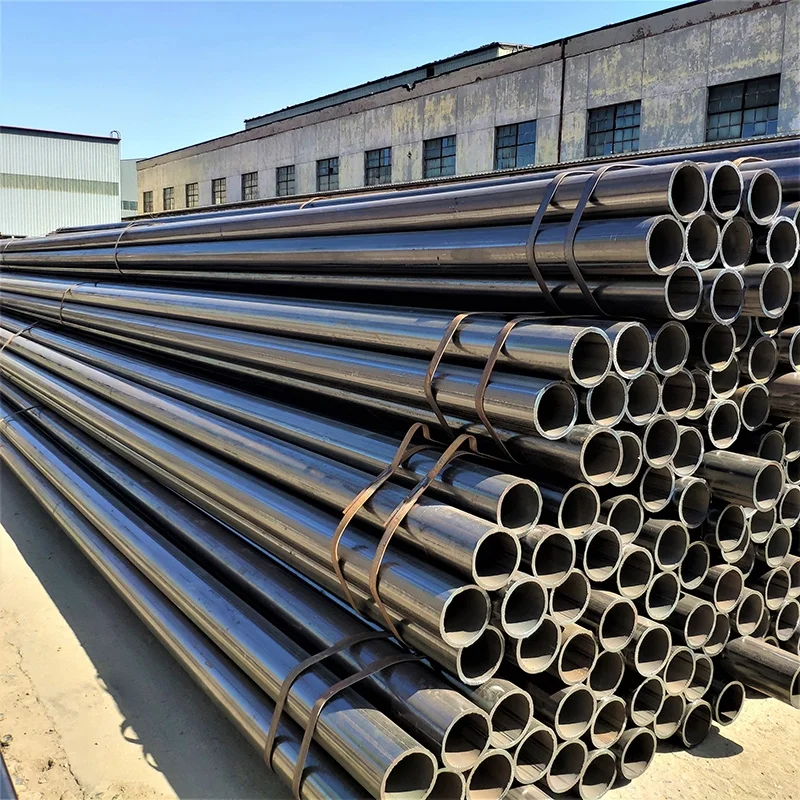ERW Carbon Steel Pipe: Indispensable Assets Across Industries
ERW, an acronym for "Electric Resistance Welded," refers to a specific pipe-making process where metal is first rolled and then longitudinally welded. This welding technique leverages electric currents to generate the requisite heat, seamlessly merging the edges. Characterized by manufacturing efficiency, robust performance, and adaptability, the ERW carbon steel pipe, particularly those made of carbon steel, have carved a niche for themselves.

Originating in the early 20th century, ERW technology was developed as a more proficient substitute for the prevalent seamless pipe manufacturing method of the time. With each passing decade, enhancements in this technology have ushered in superior welding quality, augmented production efficiency, and widened its scope of applications.
Properties of ERW Carbon Steel Pipe
ERW carbon steel pipes are extensively employed across diverse industries due to their cost-efficiency and adaptability. Below, we outline the characteristics of ERW carbon steel pipes:
Strength & Durability
1) Tensile Strength:
ERW carbon steel pipes typically possess commendable tensile strength, indicating their ability to withstand axial loads without rupture. This strength is contingent upon the steel's grade and thickness used in its fabrication.
2) Fatigue Resistance:
When correctly manufactured and handled, ERW pipes can demonstrate robust fatigue resistance. Fatigue resistance denotes the material's capacity to endure repeated cyclic loading without structural failure. Stringent quality control during manufacturing is pivotal to ensuring consistent fatigue resistance.
Corrosion Resistance
1) Factors Impacting Corrosion:
The corrosion resistance of ERW carbon steel pipes hinges on several factors, including steel composition, environmental conditions, and the presence of corrosive agents. Carbon steel is prone to corrosion, especially in the presence of moisture and aggressive chemicals.
2) Protective Measures:
Various protective strategies can enhance the corrosion resistance of ERW carbon steel pipes, encompassing:
- Coatings: Application of coatings like epoxy, zinc, or polyethylene to form a protective barrier against corrosion.
- Cathodic Protection: Implementation of sacrificial anodes or impressed current systems to shield pipes from corrosion.
- Rigorous Maintenance: Regular inspections and maintenance routines can detect and address corrosion issues at an early stage.
Weldability
Advantages of Electric Resistance Welding (ERW):
- ERW stands a favored method for welding carbon steel pipes, boasting several merits:
- Cost-Effectiveness: ERW welding is comparatively economical compared to alternatives like seamless or submerged arc welding.
- High Productivity: It facilitates efficient production of lengthy pipe sections.
- Precision: ERW delivers welds with high dimensional accuracy.
- Suitability for Thin-Wall Pipes: ERW is particularly suited for thin-wall pipes.
Heat Treatment
1) Types and Objectives of Heat Treatment:
- Heat treatment is frequently utilized to modify the properties of carbon steel pipes, including those made via the ERW method. Common heat treatment processes include annealing, normalizing, quenching, and tempering.
- Annealing: Employed to soften the steel, alleviate internal stresses, and enhance ductility.
- Normalizing: Aims to refine grain structure and enhance uniformity in mechanical properties.
- Quenching and Tempering: Utilized to attain specific hardness and strength characteristics.
2) Impact on ERW Pipe Properties:
- Heat treatment can exert a significant influence on the properties of ERW pipes. For instance, it can augment tensile strength, hardness, and toughness while alleviating residual stresses resulting from the welding process. The exact effects depend on the type of heat treatment applied and the intended application of the pipes.
ERW carbon steel pipes offer commendable tensile strength and can be rendered fatigue-resistant, though they are vulnerable to corrosion. The key benefit of the ERW process is its weldability, and heat treatment can be employed to tailor the properties of these pipes for specific requirements. Implementation of protective measures is crucial to enhance corrosion resistance and ensure the enduring durability of ERW carbon steel pipes.
Applications of ERW Carbon Steel Pipes
ERW (Electric Resistance Welded) carbon steel pipe is widely utilized in various industries due to its durability and cost-effectiveness. Here are some key areas where ERW carbon steel pipes are applied:

Oil and Gas Industry
1) Pipelines: ERW carbon steel pipes serve as a common choice for the transportation of oil and gas across extensive distances. Their reputation for high strength and reliability makes them ideal for constructing both onshore and offshore pipelines.
2) Drilling Operations: Within the drilling sector, ERW pipes find use in drilling rigs and in the extraction of oil and natural gas. Their toughness and resistance to corrosion make them well-suited for these demanding tasks.
Water Distribution
1) Municipal Water Supply Lines: ERW carbon steel pipes are frequently employed in municipal water distribution systems to convey potable water to residences and businesses. Their capacity to endure high water pressures and resist corrosion is highly valued.
2) Sewage Treatment Plants: In sewage treatment facilities, ERW pipes play a vital role in transporting wastewater and sewage due to their durability and resistance to corrosion, both of which are essential in this context.
Structural Applications
1) Buildings and Bridges: ERW carbon steel pipes are integral to the construction of buildings and bridges, where their strength and structural integrity are paramount. They are often used for load-bearing columns, beams, and other critical structural elements.
2) Support Frames: Across diverse industries such as manufacturing and construction, ERW pipes are instrumental in crafting robust and stable support frames and structures.
Other Industries
1) Automotive: In the automotive industry, ERW carbon steel pipes find application in various roles, including the production of exhaust systems, chassis components, and roll cages. Their combination of strength and weldability makes them well-suited for these specific purposes.
2) Machinery Manufacturing: ERW pipes are employed in the manufacturing of machinery and equipment, particularly for constructing structural components, conveyance systems, and other specialized parts that demand resilient and dependable materials.
Benefits of Using ERW Carbon Steel Pipes
ERW (Electric Resistance Welded) carbon steel pipes offer several benefits that make them a preferred choice in various industries. Here are some of the key advantages of using ERW carbon steel pipes:
Cost-Effective
1) Lower Initial Costs Compared to Alternatives: ERW pipes are cost-effective in terms of their initial purchase price. They are often more affordable than alternatives like seamless pipes or ductile iron pipes, making them an economical choice for many applications.
2) Maintenance Costs and Longevity: ERW pipes have a relatively long service life when properly maintained. Their durability and resistance to corrosion mean that they require fewer repairs and replacements over time, further contributing to cost savings.
Versatility
ERW carbon steel pipes can be easily customized in terms of size, thickness, and shape to meet specific project requirements. This versatility makes them adaptable for a wide range of applications and installations.
Safety
ERW pipes are known for their strength and reliability. They are less prone to leaks and breaks, which can help prevent costly accidents and environmental damage.
ii) Consistent Quality Due to Manufacturing Process: The ERW manufacturing process results in pipes with uniform and consistent quality. This reliability ensures that ERW pipes meet safety standards and perform consistently in demanding applications.
Environmental Benefits
Reduced Carbon Footprint in Production: ERW pipes typically have a lower carbon footprint in their production compared to some other materials like PVC or cast iron. The process of manufacturing carbon steel pipes tends to be more energy-efficient and produces fewer greenhouse gas emissions.
ii) Recyclability: Carbon steel is highly recyclable, and ERW pipes can be recycled at the end of their service life. This reduces the environmental impact and contributes to sustainable practices.
ERW carbon steel pipe offers cost-effective solutions with lower initial costs and reduced maintenance expenses. Their versatility allows for customization to suit specific project needs, ensuring they are adaptable for various applications. ERW pipes also provide safety benefits due to their reliability and consistent quality. Additionally, they offer environmental advantages through reduced production emissions and recyclability, aligning with sustainable practices.
CONCLUSION
ERW (Electric Resistance Welded) carbon steel pipe is an essential component in various industries, thanks to its remarkable properties, diverse applications, and numerous benefits.
In summary, ERW carbon steel pipes are indispensable assets across industries, serving as reliable, cost-effective, and eco-friendly solutions for countless applications, and their enduring popularity reflects their unwavering utility and value.






